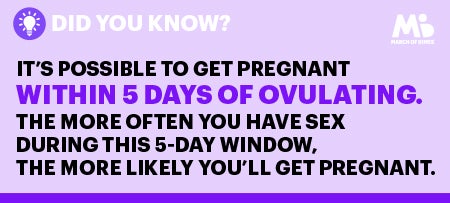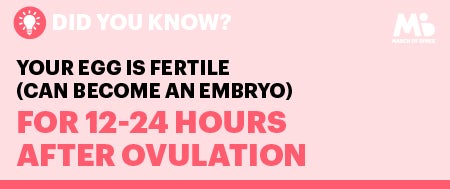Key Points
If you think you’re pregnant, take a home pregnancy test. If it’s positive, call your provider to get a blood test to confirm that you’re pregnant.
If you’re having unprotected sex, you can get pregnant if you have sex any time from 5 days before to the day of ovulation.
Use the March of Dimes Ovulation Calendar to find out when you ovulate so you know when to have sex to try to get pregnant.
When you stop using birth control, the kind you use may affect how soon you can get pregnant.
If you’re having trouble getting pregnant, don’t give up! It may just take time. Talk to your provider if you’re worried that it’s taking too long.
The ABCs of getting pregnant
If you’re thinking about getting pregnant, you probably have lots of questions. When’s the best time? What if I’m on birth control? How do I know I’m pregnant? With so much information floating around online, you need to separate fact from fiction. In this article, we provide the answers you’re looking for so you can embark on the safest, healthiest pregnancy possible.
The biology of getting pregnant
First step: ovulation
Each month your ovaries release an egg about 14 days before the first day of your period. This is called ovulation. After the egg is released, it begins a 5-day journey through one of your fallopian tubes before arriving at your uterus. Not sure when you’re ovulating? Use our helpful Ovulation Calendar to figure it out.

Next step: fertilization
If you have unprotected sex with a man while ovulating, his sperm swims to meet your egg as it’s traveling through the fallopian tube. When the egg and sperm meet, it’s called fertilization.

Final step: implantation
The fertilized egg (also called an embryo) continues to move through your fallopian tube and attaches to the wall of your uterus, where it grows and develops into a baby. When the embryo attaches to the uterus, it’s called implantation.

Ovulation and getting pregnant
The odds of getting pregnant in any given month are 15-25 percent (per a WebMD stat). So knowing when you’re ovulating is an important part of your pregnancy journey. Here are things you can do to pinpoint the days when you’re most likely to get pregnant:
Monitor your basal body temperature
Every day before getting out of bed, use a basal body thermometer to take the temperature of your body at rest. For most women, your temperature rises slightly (0.5 to 1°F) when you ovulate. The two to three days before your temperature rises are the best days to try getting pregnant. Taking your basal body temperature can tell you when ovulation has already happened, so tracking it over a few months may help you predict when you’ll ovulate in the future. But, remember, there are other things than ovulation—like having a fever, drinking alcohol or getting a good night’s sleep—that can affect your temperature.
Take note of your cervical mucus
The mucus in your vagina increases and gets thinner, clearer and more slippery just before ovulation—so aim to have sex at that time for the best chance of getting pregnant. Another way is to check your cervical mucus twice each day. If you notice an increase in mucus two days in a row, it’s a good time to try getting pregnant.
Buy an ovulation prediction kit
Use this kit to test your urine for a substance called luteinizing hormone (also called LH). This hormone increases each month during ovulation and causes the ovaries to release eggs. You know you’re ovulating when your LH increases.
How to tell if you’re pregnant
If you experience any of the signs and symptoms below, take a home pregnancy test. But make sure to call your doctor, too. Home pregnancy tests can sometimes produce a false-positive result (meaning the test says you’re pregnant when you’re not), so your doctor can confirm the results with a blood test and physical exam.
Pregnancy signs and symptoms:
- You miss your monthly period.
- Your breasts are tender or swollen, and the area around your nipples gets darker.
- You have to urinate (pee) a lot.
- You feel sick to your stomach or throw up.
- You feel tired all the time.
- You feel moody.
- You feel bloated (your stomach is swollen or you feel full).
Birth control and getting pregnant
If you stop using birth control, you can start trying to get pregnant right away. But the kind of birth control you’ve been using may affect how soon you’ll ovulate. Here’s what you can expect:
Birth control pills
You’ll begin ovulating about two weeks after you stop taking birth control pills, but your periods may not be regular for a month or two. Your period is regular if it starts the same number of days apart each month.
Depo-Provera
With Depo-Provera, you get a shot every three months to prevent pregnancy. It can take 10 months or more after your last shot before you ovulate regularly.
Implant or intrauterine device (IUD)
These types of devices get implanted in your body to prevent pregnancy—the implant under the skin of your upper arm and the IUD in your uterus. Once the doctor removes them, you can start trying to get pregnant.
Barrier methods
Male and female condoms prevent a man’s sperm from reaching a woman’s egg and can also protect against sexually transmitted infections (also called STIs or STDs). You can start trying to get pregnant as soon as you stop using them.
Ways to improve your partner’s sperm
When you embark on your pregnancy journey, you want to do everything within your power to get pregnant. This includes having your partner take steps to improve his sperm count. Why? Because the chances that one sperm will reach and implant itself into an egg increases if more sperm are present in his semen.
Here are some steps your partner can take to improve his levels of healthy, quality sperm:
Lose weight and exercise
If your partner is overweight, losing weight is one of the single most effective things he can do to increase sperm count and improve the volume and quality of his semen. And if he’s already a healthy weight, exercising—particularly weightlifting—can help improve his overall sperm quality.
Get treated for health conditions
Certain health issues may affect sperm count and quality, including kidney problems and diabetes (too much sugar in the blood).
Review your partner’s medications
If your partner takes any medications regularly, talk to his doctor to rule out any interactions the medicine may have on his sperm. This includes everything from prescription and over-the-counter medicine (like pain relievers and cough syrup), to vitamins and herbal products (like green tea and Gingko biloba).
Avoid substance abuse
Low sperm count and unhealthy sperm have been linked to people who smoke, drink alcohol heavily or use illegal drugs (like cocaine, marijuana and performance steroids). If your partner needs help quitting habits like these, encourage professional help.
Look into environmental factors
If your partner has been exposed to any chemicals or metals (like paint strippers, pesticides or lead), talk to your doctor about their potential effect on fertility (his ability to get you pregnant). You should also ask about the effect of cancer treatments (including radiation and chemotherapy) if this is a concern.
When you have trouble getting pregnant
If you’ve been trying to get pregnant for 3 or 4 months, keep trying. It may just take more time. But if you still don’t get pregnant after trying for one year (or 6 months, depending on your age), you may want to look into fertility treatment, which is a medical procedure to help you get pregnant.
Start by talking to your doctor, who can run some tests to find out why you’re having trouble getting pregnant. If there’s a problem, there’s a good chance it can be treated. Remember, your pregnancy journey is unique. There are options available, so keep a positive attitude as you move forward.
Last reviewed: March, 2023